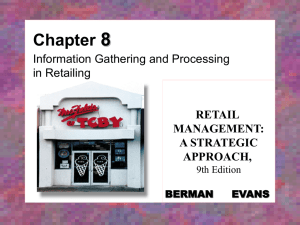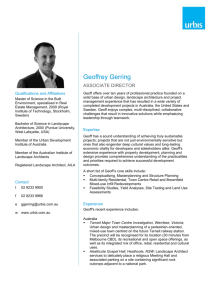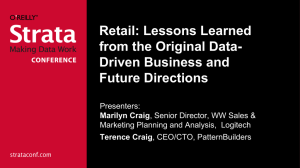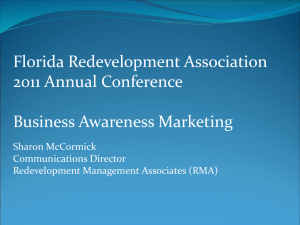hidden oc market-rate workforce housing opportunities
advertisement
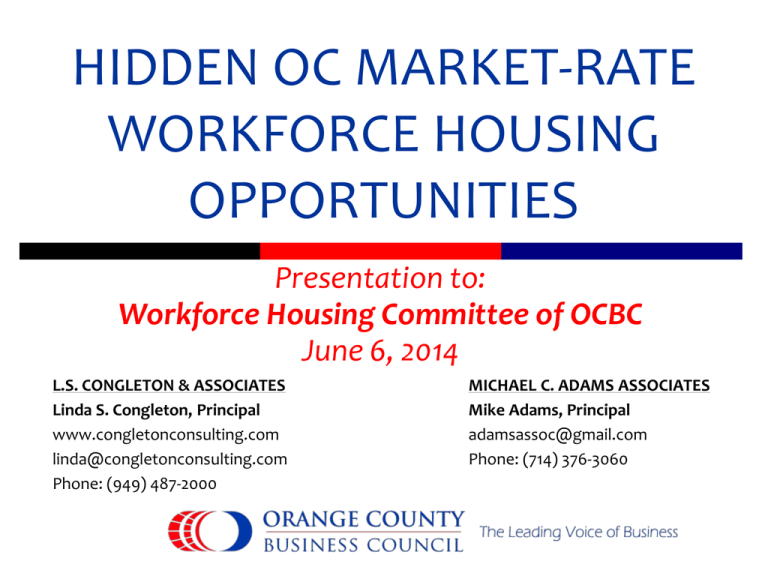
HIDDEN OC MARKET-RATE WORKFORCE HOUSING OPPORTUNITIES Presentation to: Workforce Housing Committee of OCBC June 6, 2014 L.S. CONGLETON & ASSOCIATES Linda S. Congleton, Principal www.congletonconsulting.com linda@congletonconsulting.com Phone: (949) 487-2000 MICHAEL C. ADAMS ASSOCIATES Mike Adams, Principal adamsassoc@gmail.com Phone: (714) 376-3060 “SUSTAINABLE” WORKFORCE HOUSING SITE CRITERIA 1. Market rate, non-luxury rents for apts. 2. Modest, entry-priced homes for sale 3. Non-subsidized; no government funds 4. Close to healthy OC employment hubs 5. No more than 20 min. work commute 6. Low crime 7. Good public schools 8. Recreation/churches/shopping within 10 minutes OC LACKS ZONED LAND AREAS FOR WORKFORCE NEEDS New So. OC MPC’s too far, too pricey Former OC base sites: insufficient workforce housing due to lot costs Housing land developers need high lot prices from builders due to costs/risks No supply to meet demand long-term Traffic to get worse with MPC’s build-out NON-SUBSIDIZED WORKFORCE HOUSING PRODUCT TYPE EXAMPLES Apartments (e.g., five levels) Renovated industrial/office building lofts for-rent or for-sale Small lot and square footage single family detached homes Entry-level condominiums (if & when market returns) Mixed-use retail & apartments Traditional small housing adjacent to industrial/ retail and/or major arterials 5 HIDDEN OPPORTUNITIES 1. Outdated Industrial Zoning 2. Permanently Weak Retail Uses, Strip Corridors & Centers 3. Over-zoned, Unrealistic Office Zones 4. Old, Poorly-Located, Eye-Sore Hotels 5. Unused “Public”/Civic & School Sites COMMON HIDDEN SITE CHARACTERISTICS Zoning anachronisms Zoning not reflective of very long-term business needs/plans General plans lacking market demand Cities’ unrealistic desires for retail sales & hotel transiency taxes Attitude: “Zone it and they will come.” Sites vacant or under-utilized OUTDATED INDUSTRIAL ZONING AREAS 1. Lack freeway visibility & access 2. Not suitable for regional-serving distribution facilities 3. Excess land vis-à-vis long-term demand 4. Rationale for zoning no longer exists; e.g., unused rail lines HUNTINGTON BEACH GOTHARD CORRIDOR GOTHARD CORRIDOR ISSUES Under-performing uses Surrounded by residential No freeway access/visibility GOTHARD CORRIDOR PHOTOS PERMANENTLY WEAK RETAIL Retail Follows Residential Mature residential=no retail growth Over-saturation of 1960s/1970s retail strip corridors & oversupplied weak malls Highly professional, single-operated “Power Centers,” Discount-Value Centers, Strong Department-Store Malls permanently diminish ability of strips & weak centers to come back PERMANENTLY WEAK RETAIL (continued) General Plans mistakenly protect retail corridors: retail sales tax issues More booming sales requires more homes Retail is not an ever-growing product Many weak retail corridors are eye-sores Renovation $ will not reap higher sales “Customers do not shop city boundaries...” Retail “leakage” analyses misunderstands shopping dynamics BELLA TERRA (EDINGER AVE, HB) – MIXED USE RETAIL & RESIDENTIAL SITE REUSE EXAMPLE: FORMER FREESTANDING LEVITZ FURNITURE STORE BEACH BLVD Vacant Lots/Poor Performing Strip Centers LAGUNA HILLS MALL (PERMANENTLY WEAK) UNREALISTIC OFFICE COMMERCIAL ZONING Over-zoning of office zones, particularly in secondtier No. County markets Company downsizing, greater efficiencies with fewer people New, free-form company work stations Entrepreneurial, small companies taking industrial, loft, mixed-use retail & live-work areas Non-contemporary, old, 30-year-plus configurations no longer suitable OUTDATED HOTEL/MOTEL SITES Old properties not near business centers or tourist/beach activities City reluctant to rezone due to transient taxes Badly maintained, eye sores; renovation will not improve Locations permanently weak EXAMPLE: COSTA MESA 55 FREEWAY HOTELS Adjacent to residential… UNUSED CITY/STATE/SCHOOL SITES Excess lands owned by City/State School sites well located near existing residential Substantial bureaucracy for city/state-owned lands & public scrutiny IMPLEMENTATION STRATEGIES FOR CHANGE 1. 2. 3. 4. 5. Corporations lead the way: propose workforce housing on their excess industrial/office lands—but not just for their workers Target Cities with weak financials to re-examine retail/commercial zoning Urge City officials to update General Plans, insisting that Plans be market-driven based on RESEARCH & FACTS—not futuristic “WISH LIST” Urge financially strained cities to conduct Economic Development Strategic Plan for under-utilized, underperforming commercial sites Encourage flexible mixed-use; “mixing uses;” and re-zoning in weak commercial zones



